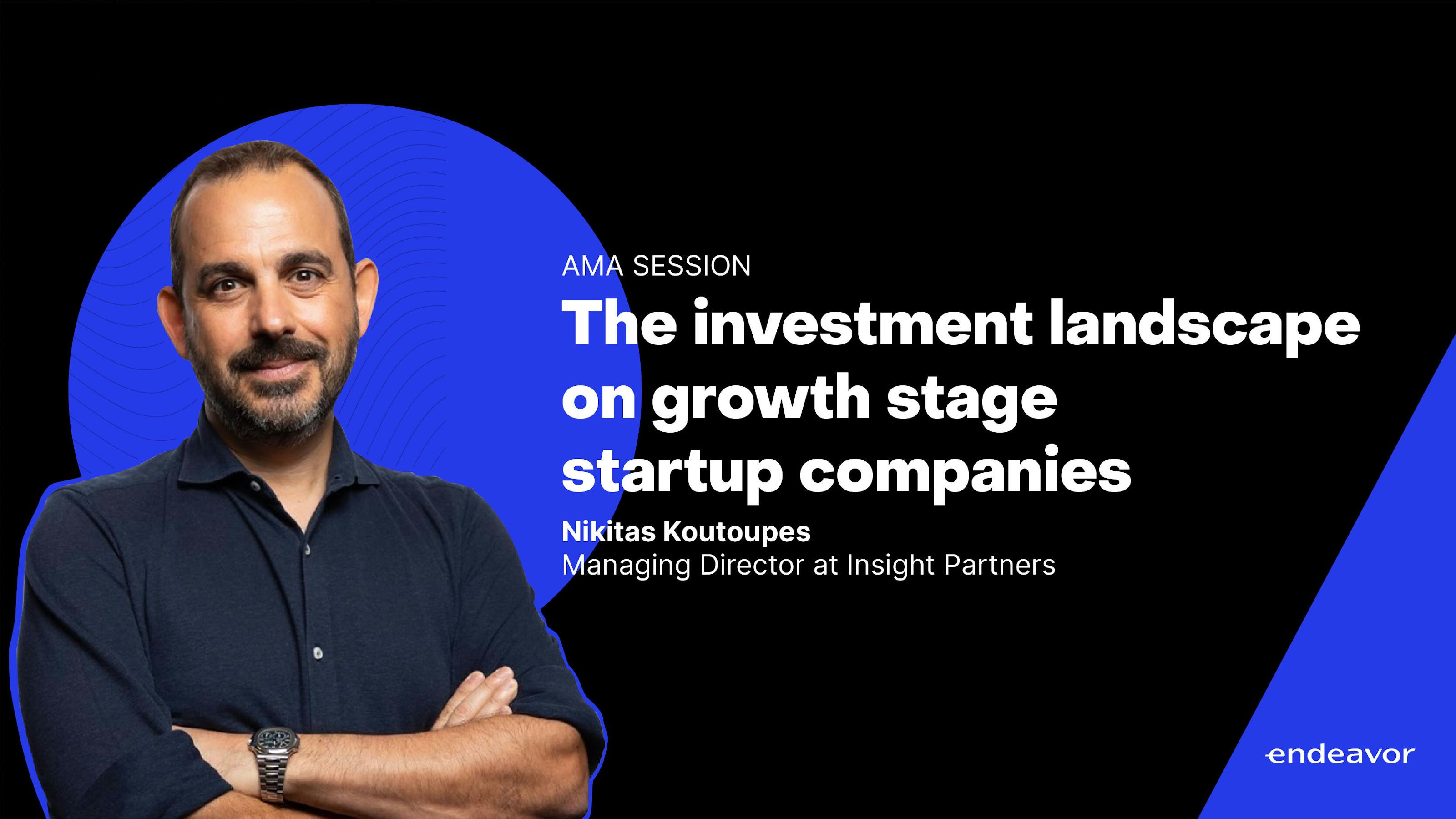Outliers Roundtable Discussion with Nikitas Koutoupes, Managing Director at Insight Partners
By Endeavor Greece Jun 25, 2023
At the Endeavor Greece offices recently, high-impact founders had a chance to speak with Nikitas Koutoupes, MD at Insight Partners.
An experienced investor, Nikitas mainly focuses on investments in application software, especially in education technology, sales and marketing automation, and construction. Prior to his current role, Nikitas was co-founder and CFO of CTSpace, a software company that became part of Insight’s portfolio and was subsequently acquired by McLaren Software. He started his career with McKinsey & Company and contributed to a research initiative entitled “The War For Talent.”
Experienced investors and curious founders always make for an insightful conversation and this one was not different, covering how Nikitas tries to avoid risks he doesn't understand; the current (challenging) state of capital markets, the right way to measure growth, and the difference between AI for automation and AI for discovery.
What sets Insight Partners apart?
Insight Partners has developed a unique approach to sourcing and investing in growth-stage software companies. One of their key strengths is their proprietary sourcing method, which allows them to avoid relying on personal connections or opinions when selecting investment targets. They also help find acquisitions for their portfolio companies and conduct extensive diligence to avoid finance-related risks. Because of their specialized investment focus, they are also able to provide insights on-site to help their portfolio companies grow post-investment.
What does it mean to be a “good company?”
Nikitas believes being a good company should not be subject to interpretation. Instead should be an arithmetic measure. In the past, being a good company was often viewed as simply making a profit, but this perception has changed over the years.
The market is confused, in Nikitas’ opinion, and has forgotten about the basics of economics. There's a current trend towards valuing companies based on their growth potential, rather than their current profitability. The market values companies based on their potential to succeed, rather than their current success. This means that companies must focus on driving growth in order to be considered "good" by today's standards.
How do you assess a company’s market size?
In assessing a company's market size, investors do not always consider net retention because there will come a point where there's nothing left to cross-sell to existing customers. Net retention measures both customer retention and expansion of usage, providing a more comprehensive overview of a company's customer base, while gross retention only measures customer retention. Growth from new clients is often more valuable than growth from existing clients
How should companies navigate the current capital market?
Scaleups should not rely solely on the current capital market as a source of finance, Nikitas advised, as it may take some time to secure funding. Nikitas also cautioned that some interactions with investors may feel discouraging due to the presence of "bottom feeders" who are solely interested in profiting from their investments, without prioritizing a mutually beneficial relationship.
In the face of uncertainty, there are structures usually reserved for early-stage startups. To ensure founders get a good night's sleep, he recommends raising a “SAFE” (Simple Agreement for Future Equity), emphasizing that the market is more important than the company itself. A SAFE is a type of fundraising structure where investors provide capital in exchange for the right to receive equity in a future financing round. It's often used by early-stage startups as a way to raise capital without having to set a valuation for the company.
Companies that are likely to run out of money by the end of the year probably want to think about seeking investments now. However, for those with more runway may want to wait for another six months to see where the market is at that point.
How should companies incorporate AI into their products?
Nikitas also underlined the distinction between using AI for automation versus discovery. AI for automation involves using algorithms to perform routine tasks and improve efficiency.AI for discovery involves exploring new insights, such as in drug discovery or experiments on language models. Companies should create a use case that incorporates AI in a way that is useful and understandable for clients.
AI for discovery is still in its early stages and requires further experimentation, while AI for automation is more developed and can be quantified for investment purposes. Ultimately, AI has the potential to be useful for all companies, but it requires careful consideration and experimentation to understand its capabilities and limitations and how to incorporate it into operations.
The effectiveness of AI of any sort is dependent on the skills of the person using it. Educating clients about AI's potential applications is important because rushing to adopt AI without fully understanding its capabilities and limitations can be destructive.
What does growth mean, and is it the ultimate goal?
While growth is often the ultimate goal for many companies, it's important to recognize that it's not always easily achievable or sustainable. For software companies in particular, there are growth models that should be avoided, such as a 20% growth with a breaking-even kind of model. This is because a typical software company doesn't have gross margins above 85%, unless there's something about the business that's not pure software. Therefore, it's important for companies to not only focus on growth, but also create a sustainable business model with healthy profit margins and a strong foundation for long-term success.
It was great to have Nikitas share his extensive knowledge and experience with our network!
